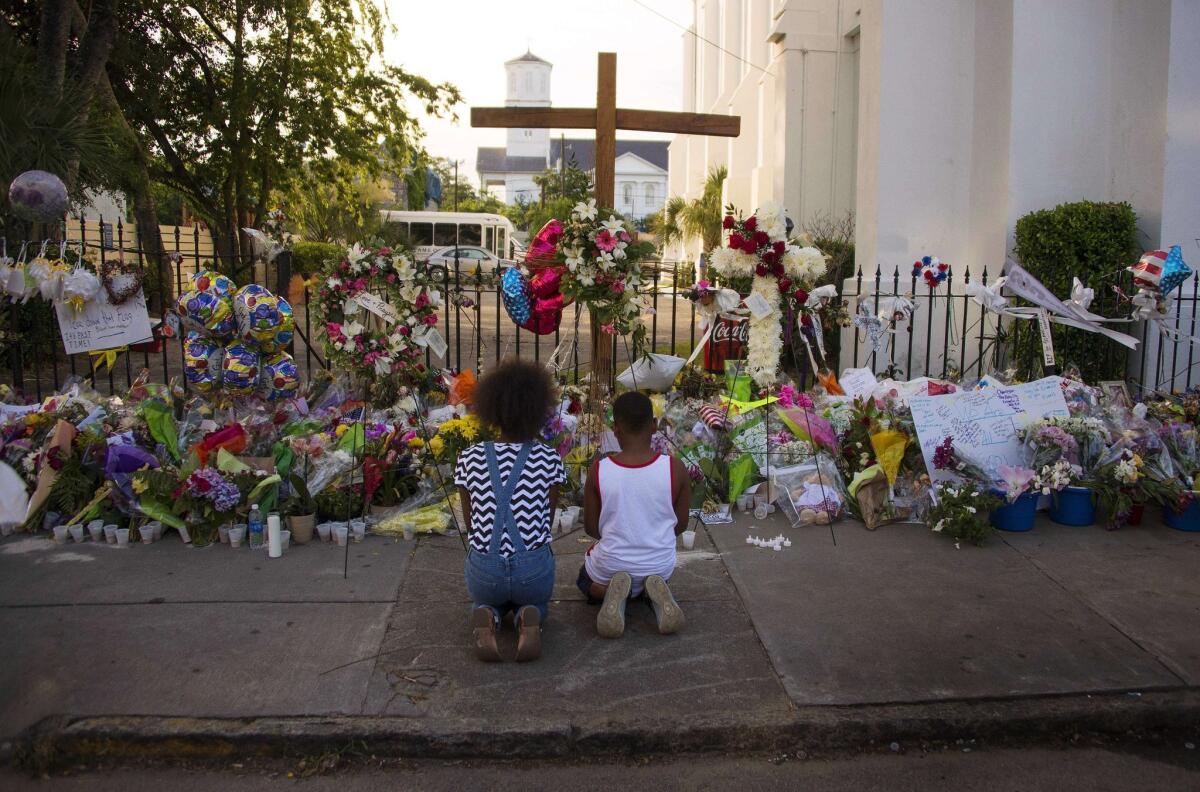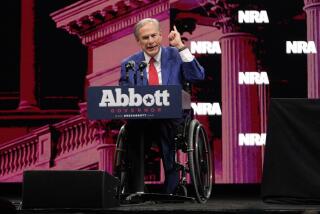Op-Ed: Forgiveness in Charleston isn’t absolution for 400 years of racial violence in America

Two children pray outside Emanuel AME Church in Charleston, S.C. where nine churchgoers were shot dead during bible study on June 17.
When Dylann Roof was arraigned in Charleston on murder charges, members of his victims’ families stated that they forgave him. Their words clearly gratified many white Americans, like GOP presidential candidate Rick Santorum, because they offered an escape from more controversial subjects. Asked what the country should do to prevent similar incidents in the future, Santorum refused to mention gun control, anti-racism education or efforts to reduce systemic racial inequality. What gave him “more hope than anything,” he said in an ABC interview, was the way the family members showed “true forgiveness.” Black people offering forgiveness to a white racist killer, he believed, revealed that “the way to overcome all of this horrible violence is through reconciliation.”
Whatever Santorum might believe, the family members’ statements will not deliver white Americans to some misty land where they no longer have to hear about the impact of nearly 400 years of racist violence. For as the Rev. William Barber told the congregation at Manhattan’s Riverside Church on Sunday, only “the perpetrator has been caught. The killer remains at large.” Roof explosively acted out a disdain for black life that is all too pervasive in American society.
The victims’ families are struggling with the private business of their own grief, using the language of Christian grace. This starts with the belief that God can forgive all sins. In turn, believers should try to do the same for the sake of their own souls and their own desire to live in harmony with God.
What too many whites seem to demand from these families’ statements, however, isn’t really grace. As the journalist Jamelle Bouie pointed out, people like Santorum insist on what the German theologian and anti-Nazi freedom fighter Dietrich Bonhoeffer called “cheap grace” — the “preaching of forgiveness without requiring repentance” from those who have sinned. The forgiveness they want is so cheap that I can only call it “Wal-Mart grace”: low-priced but shoddy, destructive of real community and built on exploitation.
Whatever faith you profess — or don’t — grace isn’t cheap. It’s one thing for a survivor of trauma to tell a handcuffed and doomed perpetrator that you forgive him. It’s another thing to forgive those who can still harm you. You don’t do that without a good reason to believe that the person who harmed you has changed into someone who will not do so again.
That kind of transformation can be signaled by atonement, a painful process that starts with acknowledging the wrongs one has committed. Atonement may involve suffering in recompense for the wrongs, and it certainly includes acting to put an end to those wrongs, even if it is costly to do so.
My fellow white Americans, I know this will discomfit some of you, but Barber was right: The killer remains at large, and the killer is us. Collectively we remain committed to beliefs and behaviors that result in the destruction of black lives.
After his arrest, Roof was jailed in the cell next to that of Officer Michael Slager, the white cop in the video-recorded killing of an unarmed black man, Walter Scott, on April 4. Roof’s alleged deeds were shocking. But many suspect that the only thing unusual about Slager’s was that he was caught in the act.
The recording is all that keeps Slager from claiming “I was afraid for my life,” which has been all that thousands of officers have needed to say to remain exempt from prosecution.
Although not every case is as clear-cut as the killing of Scott, police violence against black and brown people is endemic. Meanwhile, white fear of black participation in American life enables the mass incarceration of African Americans and the sort of revenue-driven “policing” identified in Ferguson, Mo. That same fear reportedly led Roof to say, “You rape our women and are taking over our country,” as he shot his nine victims.
There are wrongs perpetrated by individuals driven mad by white fears. There are wrongs perpetrated by those who act in our name, with the blessing of white fears. That’s why white people in the U.S. shouldn’t grab for Wal-Mart grace. Instead, they should take this occasion to consider whether they are complicit in our long history of white supremacy. It would be wise to start by listening to what nonwhite people have to say about the ways in which white privilege works to disadvantage them and advantage us.
For some, that will be a new and uncomfortable experience. Yet if white Americans want reconciliation, they will have to brave the dangers of atonement. And so what if there is danger? Because of what whites do or leave undone, living while black has always been far more dangerous than it should be. For African Americans, violent death has too often been the cost of standing up for black life. Sometimes death has even been the cost of kneeling in prayer.
Edward E. Baptist is a professor of history at Cornell University and the author of “The Half Has Never Been Told: Slavery and the Making of American Capitalism.”
More to Read
A cure for the common opinion
Get thought-provoking perspectives with our weekly newsletter.
You may occasionally receive promotional content from the Los Angeles Times.










